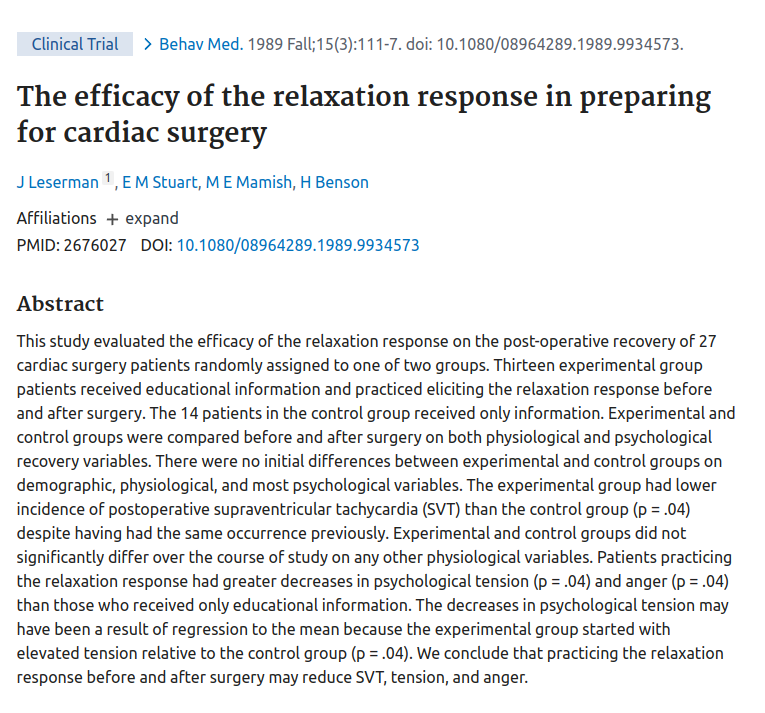This study evaluated the efficacy of the relaxation response on the postoperative recovery of 27 cardiac surgery patients randomly assigned to one of two groups. Thirteen experimental group patients received educational information and practiced eliciting the relaxation response before and after surgery. The 14 patients in the control group received only information. Experimental and control groups were compared before and after surgery on both physiological and psychological recovery variables. There were no initial differences between experimental and control groups on demographic, physiological, and most psychological variables. The experimental group had lower incidence of postoperative supraventricular tachycardia (SVT) than the control group (p = .04) despite having had the same occurrence previously. Experimental and control groups did not significantly differ over the course of study on any other physiological variables. Patients practicing the relaxation response had greater decreases in psychological tension (p = .04) and anger (p = .04) than those who received only educational information. The decreases in psychological tension may have been a result of regression to the mean because the experimental group started with elevated tension relative to the control group (p = .04). We conclude that practicing the relaxation response before and after surgery may reduce SVT, tension, and anger.
The Efficacy of the Relaxation Response in Preparing for Cardiac Surgery
Publication
Behavioral Medicine
Volume 15, Issue 3, 111-117
Abstract
Web and Email Links
Related Listings
Journal
Neurobiology of Stress
Journal devoted to the neurobiology of stress
Journal
Yoga Alliance
About This Workshop 70-90% of all primary care visits in America are related to chronic stress and stress-related illnesses such as anxiety, depression, PTS, heart disease, headaches, GI disruptions, and more. In the next workshop of the Scientific Research series, Yoga Alliance Director of Research, Dr. Sat Bir Singh Khalsa is joined by Dr. John Denninger, Director of Research at the Benson-Henry Institute for Mind Body Medicine at Massachusetts General Hospital and Harvard Universit […]
Journal
PLOS ONE
Background Poor psychological and physical resilience in response to stress drives a great deal of health care utilization. Mind-body interventions can reduce stress and build resiliency. The rationale for this study is therefore to estimate the effect of mind-body interventions on healthcare utilization. Objective Estimate the effect of mind body training, specifically, the Relaxation Response Resiliency Program (3RP) on healthcare utilization. Design Retrospective controlled […]

